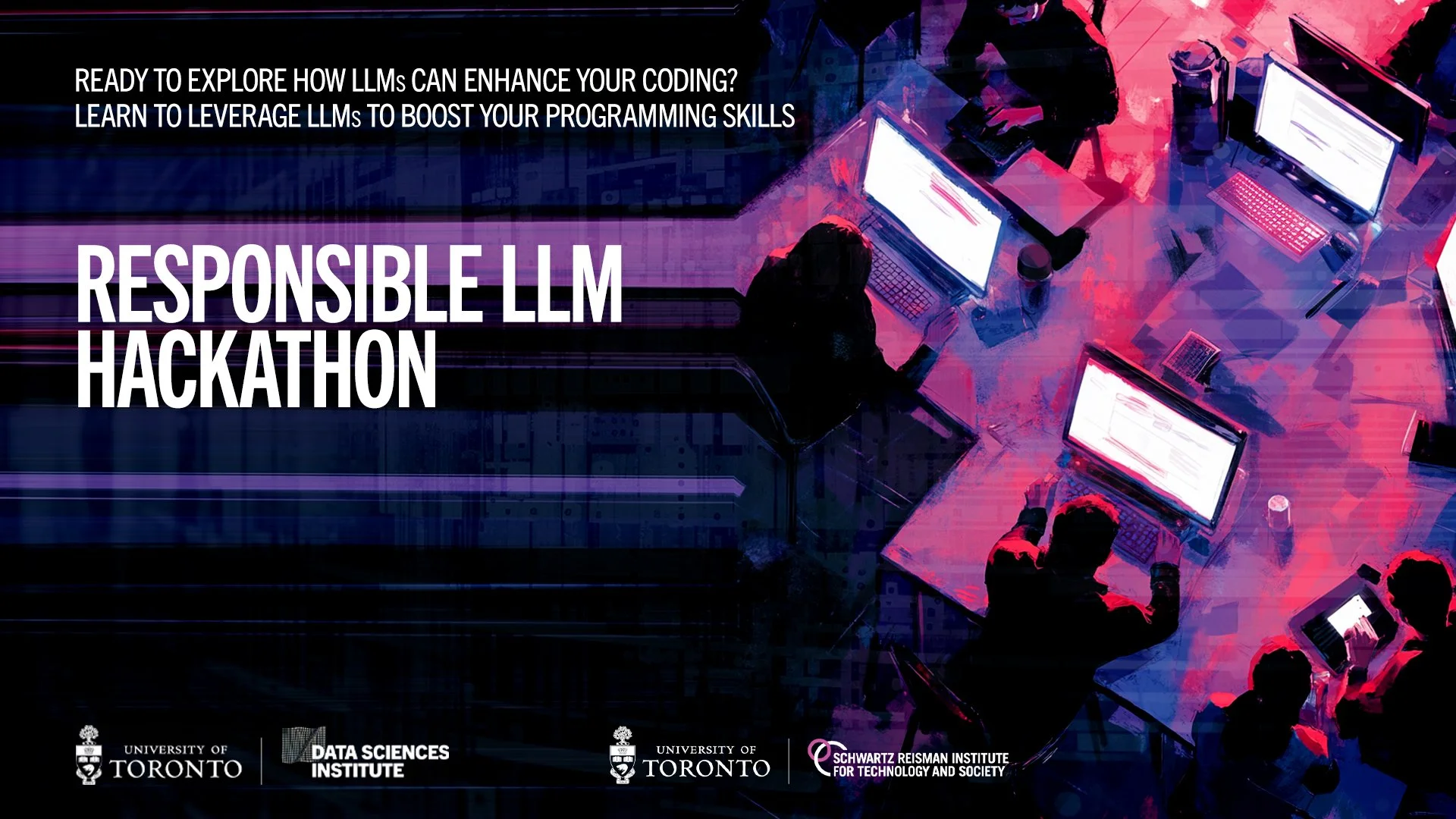Join us for at two-day event that merges the hands-on coding experience of hackathons with cutting-edge research presentations to explore the latest in large language models and how they can be developed and deployed responsibly. This event is co-sponsored by the Schwartz Reisman Institute for Technology and Society (SRI) and the Data Sciences Institute (DSI) at the University of Toronto.
On October 4, 2024, we invite all University of Toronto students—graduate or undergraduate—to register for a day-long hackathon centered on the innovative and responsible use of LLMs in developing intelligent systems.
On October 5, 2024, we invite anyone interested to register to attend a symposium where leading researchers will present their latest advancements in the development, applications, and ethical considerations of LLMs.
See details, locations, and schedule below.
About this event
The Data Sciences Institute (DSI) and the Schwartz Reisman Institute at the University of Toronto present a dynamic two-day event on the latest advancements in LLM research and its integration into the programming landscape. Learn about the current progress of LLMs and design the future of AI systems with principles of responsibility, inclusivity, and accessibility.
The hackathon (October 4) and symposium (October 5) are part of the DSI Emergent Data Science Program Toward a Fair and Inclusive Future of Work with ChatGPT, which is focused on the responsible development and ethical implementation of generative AI, specifically examining the impact of ChatGPT on diverse communities. By delving into the societal implications of using ChatGPT, the program aims to equip researchers and users with a deeper understanding of the potential social impact and ethical considerations associated with these technologies.
October 4: Responsible LLM hackathon
We invite University of Toronto students—graduate or undergraduate—to participate in a dynamic hackathon centered on the innovative and responsible use of LLMs in developing intelligent systems. The hackathon provides a unique opportunity to collaborate on forward-thinking projects that emphasize ethical AI development and responsible technology. Beginners and experts are both welcome; no prior experience in data science, computer science, or coding is necessary.
Participants will work in teams to design, develop, and implement cutting-edge solutions using state-of-the-art models, competing for prestigious awards. The hackathon offers a platform to engage deeply with the latest advancements in AI and contribute to shaping a future where technology is both powerful and responsible. Don’t miss this chance to be part of a vibrant community of innovators.
Please note: space is limited to 50 students on a first-come, first-served basis. Registration does not guarantee a spot, so be sure to sign up early.
The hackathon takes place at:
Schwartz Reisman Innovation Campus
108 College St, Toronto, ON (map)
North Winter Gardens, 10th floor
October 5: Responsible human-LLM collaboration symposium
Join us for a day-long symposium during which leading researchers will present their work on latest advancements in the development, applications, and ethical considerations of LLMs. Our goal is to foster a community dedicated to establishing robust guidelines, policies, and safeguards for the ethical use of LLMs. Attendees will gain valuable insights into the future trajectory of LLMs and their societal impact. Register for the symposium on this page.
This symposium is the second installment in a series. To explore the discussions from the previous workshop, visit Fairness – ChatGPT Workshop.
The symposium takes place at:
Data Sciences Institute
700 University Avenue, Toronto, ON (map)
DSI Seminar room 10031/10032, 10th floor
Schedule:
Please visit this page on the DSI website for a complete schedule of events on both October 4 and October 5. Talk titles will be announced shortly.
Venues:
The hackathon takes place at:
Schwartz Reisman Innovation Campus
108 College St, Toronto, ON (map)
North Winter Gardens, 10th floor
The symposium takes place at:
Data Sciences Institute
700 University Avenue, Toronto, ON (map)
DSI Seminar room 10031/10032, 10th floor
Sponsors:
Data Sciences Institute, University of Toronto
Schwartz Reisman Institute for Technology and Society, University of Toronto
If you have any questions or requests for accomodation, please reach out to Jiessie Tie at jiessie.tie@mail.utoronto.ca and/or Shurui Zhou at shurui.zhou@utoronto.ca.
About the Data Sciences Institute
The Data Sciences Institute (DSI) at the University of Toronto is a central hub and incubator for data science research, training, and partnerships. Data Sciences is defined as the science of collecting, manipulating, storing, visualizing, learning from, and extracting useful information from data in a reproducible, fair and ethical way.
In 2021 the University of Toronto launched the DSI to unify data sciences research across the University, its affiliated research institutes, and external partners. The DSI leverages the University’s leadership and expertise in the foundational and emergent fields of data sciences. Our programs and initiatives are designed to facilitate collaboration, as well as the development and application of new data science methodologies and tools in a training-focused environment.
About the Schwartz Reisman Institute
Located at the University of Toronto, the Schwartz Reisman Institute for Technology and Society’s mission is to deepen our knowledge of technologies, societies, and what it means to be human by integrating research across traditional boundaries and building human-centred solutions that really make a difference. The integrative research we conduct rethinks technology’s role in society, the contemporary needs of human communities, and the systems that govern them. We’re investigating how best to align technology with human values and deploy it accordingly. The human-centred solutions we build are actionable and practical, highlighting the potential of emerging technologies to serve the public good while protecting citizens and societies from their misuse. We want to make sure powerful technologies truly make the world a better place—for everyone.

